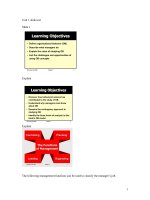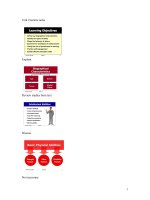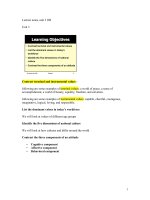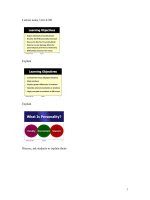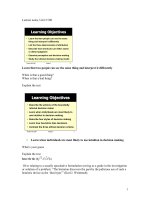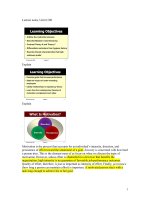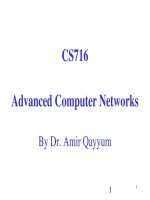Organizational behavior: Lecture 39 - Dr. Mukhtar Ahmed
Bạn đang xem bản rút gọn của tài liệu. Xem và tải ngay bản đầy đủ của tài liệu tại đây (660.85 KB, 50 trang )
Organizational
Behavior
(MGT-502)
Lecture-39
Summary
of
Lecture-38
Managing
Change
The Change Agent’s Role
Change agent - the individual
or group who undertakes the
task of introducing and
managing a change in an
organization
The change agent can be internal or external
Organizational Change
Unfreezing
Changing
Refreezing
Lewin’s Three-Step Process
Today’s Topics
The Challenges of
Organizational Change
• Targets for Change
–tasks
–people
–culture
–technology
–structure
Dealing with Resistance
to Change
• Education and Communication
• Participation and Involvement
• Facilitation and Support
• Facilitation and Agreement
• Manipulation and Co-optation
Quick Fix
Planned Change
Planned Change
Organizational Development
OD a set of
techniques or tools
that are used to
implement
organizational change
Organization Development
Comprehensive approach to planned
organizational change that involves
the application of behavioral science
in a systematic and long range effort
to improve organizational
effectiveness
Organizational Development
Techniques
Sensitivity Training
Training groups that seek to
change behavior through
unstructured group
interaction
Organizational Development
Techniques (cont’d)
Survey Feedback
Approach
The use of questionnaires to
identify discrepancies among
member perceptions; discussion
follows and remedies and
suggested.
Organizational Development
Techniques (cont’d)
Process Consultation
A consultant gives a client insight into what is
going on around the client, within the client
and other people; identifies processes that
need improvement.
Organizational Development
Techniques (cont’d)
Team Building
High interaction among
team members to increase
trust and openness.
Team Building Activities:
• Goal and priority setting.
• Developing interpersonal relations.
• Role analysis to each member’s role and
responsibilities.
• Team process analysis.
Organizational Development
Techniques (cont’d)
Intergroup Development
OD efforts to change the attitudes,
stereotypes, and perceptions that
groups have of each other.
Intergroup Problem Solving
• Groups independently develop lists of
perceptions.
• Share and discuss lists.
• Look for causes of misperceptions.
• Work to develop integrative solutions.
Organizational Development
Techniques (cont’d)
Appreciative Inquiry
Seeks to identify the unique qualities and
special strengths of an organization, which can
then be built on to improve performance.
Organizational Development
Techniques (cont’d)
• Quality of Work life (QWL)
• Management by Objectives
(MBO)
Contemporary Change Issues for
Today’s Managers
• Stimulating Innovation
• Creating a Learning Organization
• Managing a Learning Organization
• Knowledge Management (KM)
• Culture-Bound Organizations
What is Stress?

